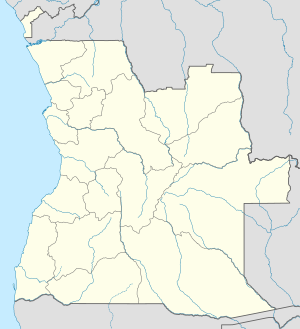Luanda
| Luanda | |
|---|---|
| City | |

View of Luanda bay, February 2013
|
|
| Location of Luanda in Angola | |
| Coordinates: 8°50′18″S 13°14′4″E / 8.83833°S 13.23444°E | |
| Country |
|
| Province | Luanda |
| Founded | 1576 |
| Area | |
| • City | 113 km2 (44 sq mi) |
| • Metro | 2,257 km2 (871 sq mi) |
| Elevation | 6 m (20 ft) |
| Population (2014 Census) | |
| • City | 2,825,311 |
| • Density | 25,000/km2 (65,000/sq mi) |
| • Urban | 2,107,648 |
| • Urban density | 18,169/km2 (47,060/sq mi) |
| • Metro density | 2,899/km2 (7,510/sq mi) |
| Time zone | +1 |
| Climate | BSh |
Coordinates: 8°50′18″S 13°14′04″E / 8.83833°S 13.23444°E
Luanda, formerly named São Paulo da Assunção de Loanda, is the capital and largest city in Angola, and the country's most populous and important city, primary port and major industrial, cultural and urban centre. Located on Angola's coast with the Atlantic Ocean, Luanda is both Angola's chief seaport and its administrative centre. It has a metropolitan population of over 6 million. It is also the capital city of Luanda Province, and the world's third most populous Portuguese-speaking city, behind only São Paulo and Rio de Janeiro, both in Brazil, and the most populous Portuguese-speaking capital city in the world, ahead of Brasília, Maputo and Lisbon.
The city is currently undergoing a major reconstruction, with many large developments taking place that will alter its cityscape significantly.
Portuguese explorer Paulo Dias de Novais founded Luanda on 25 January 1576 as "São Paulo da Assumpção de Loanda", with one hundred families of settlers and four hundred soldiers. In 1618, the Portuguese built the fortress called Fortaleza São Pedro da Barra, and they subsequently built two more: Fortaleza de São Miguel (1634) and Forte de São Francisco do Penedo (1765-6). Of these, the Fortaleza de São Miguel is the best preserved.
...
Wikipedia

